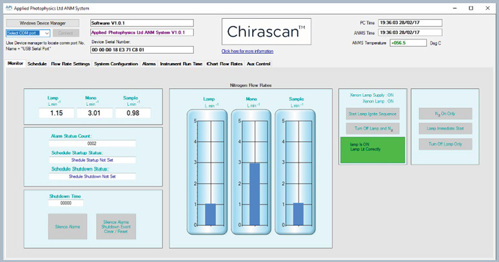Applied Photophysics is a company with a prestigious legacy and has been supporting scientists for over 50 years.
The laboratory standard circular dichroism instrument
Suitable for studying chiral molecules of all types and sizes, this Chirascan CD spectrometer has featured in thousands of publications since its introduction in 2005. Often used to analyze biomolecules, Chirascan data contributes to a deeper understanding of biomolecular characteristics, mechanisms and interactions.
More than α-helix and β sheet -
determine structural and thermodynamic properties
- Gain insight and detect changes in secondary and tertiary structure
- Determine response to thermal or chemical change
- Study folding and unfolding mechanisms
- Expand capabilities with dedicated Chirascan accessories
- Ensure reliability with our five-year warranty*
Features and accessories
Chirascan systems are supplied with the features and accessories required for acquisition of high quality data from ‘day one’.
- Removes common gas impurities
- Regulates purge gas consumption
- Software-controlled
- Software-controlled
- Up-time recorded
- Produces horizontally, linearly polarized monochromatic light
- Dual polarizing prisms maximize light throughput
- Converts horizontally polarized light to circularly polarized light. Alternates between left- and right-handed circular polarized light
- Consistent analytical conditions
- Continuous temperature ramps (single sample mode)
- Dissipates heat from sample chamber and sample storage Peltiers
- Selected for far- and near-UV CD analysis of biomolecules (single sample mode)
Control and analysis software
- Easily defined run parameters and store routine protocols
- Saves time with scheduled start-up/shutdown of lamp and N2 supply
- Fail-safe lamp switch-off if N2 flow drops
- Ensures O2-free conditions with N2 purge
- Recognizes flow cell to select optimal run/wash/dry protocol

Research Insights
Dr Dan Pantos
Dr Dan Pantos, a Senior Lecturer and Head of Organic Chemistry at the University of Bath, utilises the Chirascan CD instrument from Applied Photophysics for various research projects. His primary research involves studying the interactions between chiral small molecules and quadruplex DNA, with the goal of developing anti-cancer treatments.
Dr Tonya Zeczycki
Dr Tonya Zeczycki, an associate professor at the Brody School of Medicine at ECU, studies Alzheimer's, Parkinson's, and other neurodegenerative diseases in her lab. She focuses on protein interactions, misfolding, and aggregation.
User Cases
Peptide Therapeutics
Related Content

01
Optimising Circular Dichroism Measurements
Learn with our interactive demo

02
Temperature-Dependant Circular Dichroism Spectroscopy Measurements
Learn with our interactive demo

03
How low can we go?
